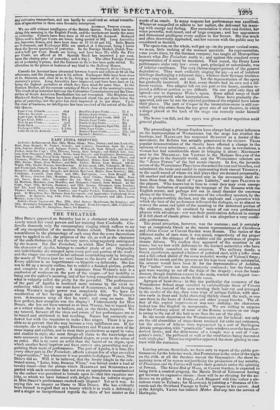THE THEATRES.
Mus DmA,v appeared on Saturday last in a character which more se- verely tested her vocal powers and her training than Cinderella. Cin- derella demands only the commonplace singing which suffices to set off any composition of the modern Italian school. There is so much resemblance in the phraseology of each song that the same decorations may be applied to all ; the progress of the air, as well as the character of the embellishments, if not the very notes, being regularly anticipated by the hearer. 13ut Der Freischutz, in which Miss DELCY sustained the character of Agatha, belongs to another grade of art. Originality and individuality are stamped upon every part and portion of the work ; and the singer can succeed in her arduous undertaking only by bringing the music of WEnxis (not her own) home to the hearts of her auditors. Every addition is an impertinence—a blemish—a deformity. She has not to fill up a meagre outline, but to exhibit a finished picture, perfect mid complete in all its parts. A departure from WEBER'S text is a confession of weakness on the part of the singer—of her inability to bring out the author's meaning, and of her being compelled to substitute -what is vulgarly called the pretty for the powerful. The performance of the part of Agatha is rendered more arduous by the vivid re- collection whielt every one must have of SCHROEDER, in and through whom WEBER'S magic power was completely felt. We have no recollection of her having made the slightest change ill WEBER'S text. SCHROEDER sang all that he wrote, and sang no more. But how perfect, how complete was the display ! Unfortunately for Miss DELCY, she has not been tutored so to treat WEBER, but to regard him as a writer whom she is to bedizen, and, as she thinks, improve. We say tutored, because all the vices and errors of her performance are to be traced and attributed to bad teaching. Nature has eminently en- dowed her with the requisites to make a fine singer. These it is pos- sible so to pervert that she may become a very indifferent one. If, for example, she is taught to regard Dom= and WEBER as men of the same stamp awl calibre, and to treat their productions as equal in value and similar in style, she must forego all claim to the knowledge and taste necessary to form an accomplished singer, or even to the name of an artist. She is no more an artist than the barrel of au organ, upon which another hand imprints and fixes certain airs, prescribing and re- gulating their mode of performance. The part of Agatha, it is true, like every other part in Der Freischut:, affords a singer few of what are called "opportunities ;" but whenever it was possible to disfigure WEBER, Miss DELCY did so. Will it be believed, that the lovely adagio in the Me- brated scena, " Leise, leise, fromme Wiese," was buried under a load of tawdry tinsel—that the phrase which MILIBRAN and SCHROEDER re- garded with such reverence that not even an appogiatura unauthorized by the author was permitted to intrude upon it—that this exquisite me- lody, to which we have listened with delight from far inferior singers, in Miss DELCY'S performance excited only disgust ? Yet so it was. In saying this we impute no blame to Miss DELCY. She has evidently been trained to regard that as a beauty which is in truth a deformity ; and a singer so inexperienced regards the dicta of her Master as the words of an oracle. In many respects her performance was- excellent. Whenever compelled to adhere to her author, she delivered his mean- ing with energy and feeling. Her enunciation is clear and distinct., her voice powerful, well-toned, and of large compass ; and her appearance And demeanour predispose every auditor in her favour. She was much . and often deservedly applauded, and her success with the public may be considered as decided.
The opera was, on the whole, well got up—in the proper musical sense, we mean, little reeking of the maimed spectacle. Its representation, some years since, by the German company, has taught all Metropolitan hearers what Der Freischutz really is; • and against this standard every representation of it must be measured. Thus tested, the Drury Lane performance sinks very low : every part, principal or subordinate, was of inferior excellence. The very chorus-singers partook of the general degradation. They were evidently singing for pay—a set of indolent hirelings discharging a reluctant duty ; whereas their German brethren always sang with heart and soul. Yet the representation of the opera has gradually improved. At first, every theatre had its own and a dif- ferent version. One adapter left out one part as too heavy, another re- jected a different portion as ton difficult. On one point only they all agreed—not to represent Weber's opera. Some added songs of their own, or perpetrated other iuterpolations. These have gradually dis- appeared, and one by one the rejected portions of the original have taken their places. The part of Caspar in the incantation-scene is still cur- tailed ; but this arises from the too great size of our theatres, in which a singer placed at the back of the stage can scarcely make himself heard.
The house was full, and the opera was given out for repetition amid general plaudits.


























 Previous page
Previous page